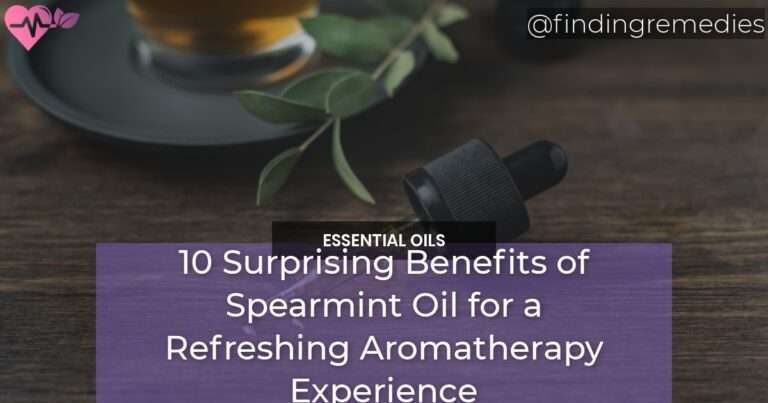Aromatherapy is a holistic practice that harnesses the power of natural scents to promote feelings of physical and emotional well-being. One of the most popular essential oils for aromatherapy is Spearmint oil. Widely used for its minty aroma, Spearmint oil has a variety of surprising benefits for the mind, body, and soul.
In this article, we’ll explore the unique therapeutic benefits of Spearmint oil and how it can be used to enhance your aromatherapy experience. We’ll also discuss how to use Spearmint oil safely and effectively to reap the most benefits. With its soothing aroma, Spearmint oil can be a powerful tool for relaxation, stress relief, and mental clarity. So, if you’re looking for a refreshing and revitalizing aromatherapy experience, look no further than Spearmint oil.
Table of Contents
What is Spearmint Oil?
Definition
Spearmint oil is a type of essential oil that is derived from the leaves of the spearmint plant. It is a member of the mint family and has a refreshing and invigorating scent.
History and Origin
Spearmint has been used for medicinal purposes for thousands of years. It is believed to have originated in the Mediterranean region and has since been used in various cultures around the world.
Extraction Process
Steam Distillation
Spearmint oil is extracted using steam distillation. This involves steaming the spearmint leaves and collecting the resulting oil.
Yield
The yield of spearmint oil varies depending on the quality of the leaves, but it typically takes around 1 pound of leaves to produce 1 ounce of oil.
Chemical Composition
Active Compounds
Spearmint oil contains a number of active compounds, including menthol, carvone, limonene, and cineole.
Properties
– Cooling effect
– Digestion aid
– Respiratory health
– Anti-inflammatory
– Antimicrobial
– Antifungal
– Antioxidant
– Mental clarity
– Stress relief
– Hormonal balance
– Skin care
– Hair care
– Natural remedies
Benefits of Spearmint Oil
Digestive Health
Spearmint oil has been shown to aid in digestion and relieve symptoms such as bloating, gas, and indigestion.
Respiratory Health
Spearmint oil has a cooling effect and can help relieve symptoms of respiratory issues such as congestion, coughs, and sore throats.
Skin Health
Spearmint oil has antimicrobial properties and can help improve the overall health and appearance of the skin.
Mental Health
Spearmint oil has a refreshing and invigorating scent that can help improve mental clarity and relieve stress.
Uses of Spearmint Oil
Aromatherapy
Spearmint oil is commonly used in aromatherapy to promote relaxation, mental clarity, and stress relief.
Culinary Uses
Spearmint oil can be used in cooking and baking as a natural flavoring agent.
Personal Care Products
Spearmint oil can be found in various personal care products such as toothpaste, mouthwash, and soap due to its refreshing scent and antimicrobial properties.
Cleaning Products
Spearmint oil can be used in cleaning products due to its antimicrobial and refreshing properties.
Safety and Risks of Spearmint Oil
Dosage
Spearmint oil should be used in small amounts and diluted before use.
Side Effects
Spearmint oil may cause skin irritation or allergic reactions in some individuals.
Contraindications
Spearmint oil should be avoided by pregnant women and individuals with liver or gallbladder disorders.
How to Use Spearmint Oil
Topical Application
Spearmint oil can be diluted and applied topically for a cooling and refreshing effect.
Inhalation
Spearmint oil can be used in a diffuser for aromatherapy purposes.
Internal Use
Spearmint oil can be used in cooking and baking, but should be used sparingly.
Conclusion
Spearmint oil is a versatile essential oil that has a number of health benefits and uses. It should be used with caution and in moderation due to its potency.

